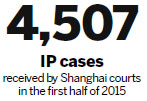Courts in Shanghai are stepping up their efforts in dealing with intellectual property rights-related cases, a move to support the city's ambition to become a global center for innovation.
Earlier this year, President Xi Jinping called for building Shanghai, the country's largest cosmopolitan city and economic hub, into a global center for technology and innovation as a new strategy to drive economic growth.
Following that call, the Shanghai High People's Court recently released guidelines that clarifies its working goals and main tasks in helping the city become a global science and technology center.
The guidelines are in five parts with a total of 23 articles. According to the guidelines, Shanghai will further promote the reform of its judicial system, improve the judicial mechanism and address issues that influence justice and constrain judicial efficiency and ability.
Mao Ronghua, vice-president of the Shanghai High People's Court, said it would work to create an internationally influential judicial environment and fulfill its judicial role of standardization, guidance, promotion and protection in intellectual property cases.
In recent years, Shanghai courts have strengthened their efforts in intellectual property-related cases, especially those connected to the construction of a global science and technology center. A specialized intellectual property court was established in the city.
"In recent years, the number of intellectual property-related cases has risen sharply. This reveals that the demand for IP protection is increasing with the city's economic restructuring and the promotion of IP awareness," Mao said.
He said the number of IP-related cases has grown by about 20 percent in recent years.
Last year, Shanghai courts received a total of 7,688 IP-related cases, an increase of 15.06 percent from 2013, and decided 7,619, a 20.34 percent rise. They received 4,507 such cases in the first half of this year, up 26.1 percent year-on-year, and concluded 3,976, up 17 percent.
The involved fields have also gradually expanded from the machinery and chemical industries to microelectronics, information technology, biotechnology and other high-tech areas, which coincides with the growing trend of high-tech enterprises assembling in Shanghai.
As more and more domestic and international companies located their research and development centers in Shanghai, the number of IP cases involving technical research secrets is also on the rise, according to the court.
Mao said the court will increase the punishments for IP rights infringements in science and technology-related cases, so as to fully embody the market value of intellectual property.
"For those serious cases that maliciously violate intellectual property rights, the courts should properly introduce punitive compensation, tighten the fight against infringements and increase the deterrents," he said.
In addition, the Shanghai High People's Court said it would fully promote judicial openness and diverse systems to solve IP disputes in the science and technology fields.
It will also carry out a series of activities to provide advance warnings of IP rights protection and overseas legal aid services for domestic enterprises seeking overseas development.
wanghongyi@chinadaily.com.cn

(China Daily 08/12/2015 page17)

